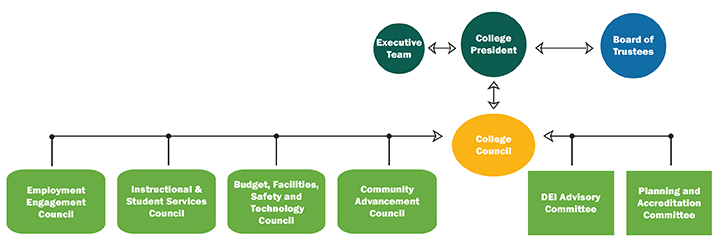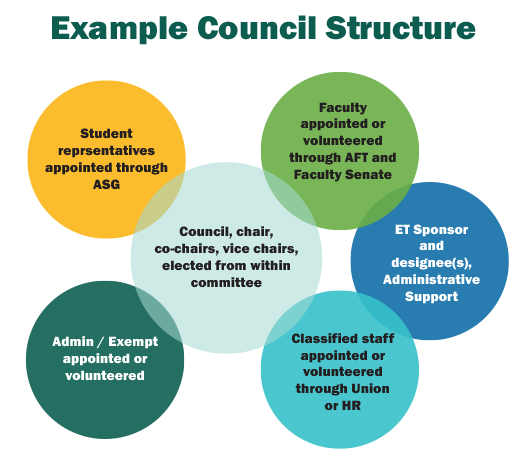Participatory Governance
Participatory Governance Model
College governance at Shoreline Community College shall be a shared participatory
system in
which every member of the College community can influence decisions regarding operational
policies and priorities and provide direction for the College. Under this system,
the College
community shall arrive at appropriate and timely decisions in a manner consistent
with the
principles of open and honest communication.
What is Participatory Governance at Shoreline College?
A participatory governance system is required to conform to Standard 2.A.1 and 2.A.4 of the Northwest Commission on Colleges and Universities (NWCCU), which requires:
- a broad understanding of the governance system by the college community;
- clearly defined authority, roles, and responsibility; and,
- consideration of the views of faculty, staff, administrators, and students in decision making processes on matters in which they have a direct and reasonable interest.
- institution’s decision-making structures and processes, which are documented and publicly available, must include provisions for the consideration of the views of faculty, staff, administrators, and students on matters in which each has a direct and reasonable interest.

Councils
The purpose of the College Council is to advise the President on matters affecting the effectiveness of the council, committee structure, and policies (except those pertaining to academic and budget), as well as monitor progress on the strategic plan indicators, measures, and outcomes. A major function of the College Council is to provide recommendations to the Executive Team on matters of governance that reside in the charters of the other councils.
Sponsored by:
Dr. Jack Kahn, President
The purpose of the BFST Council is to guide the College Council and the Executive Team by reviewing, discussing, and advising on:
- Recommendations from its Reporting Committees
- Budget and committee-related policies and administrative procedures
- Resource allocation alignment with the College's Equity-Centered Strategic Plan and the College's mission, vision, and goals
- Information on and transparency related to the College's budget development and execution process
Sponsored by:
Joe Mazur, Vice President of Business & Administrative Services
The Communications and Advancement Council (CAC) at Shoreline Community College serves as a strategic advisory body to enhance and support the College’s communication, marketing, public relations, advancement, and fundraising efforts. The Council works collaboratively to contribute to a consistent and effective messaging strategy, foster community engagement, and strengthen institutional visibility.
Sponsored by:
Cat Chiappa, Executive Director of Communications and Marketing
Wendy Coates, Executive Director of SCC Foundation and College Advancement
The Employee Engagement Council (EEC) serves as the leadership group for assigned committees and workgroups regarding activities which support, develop, and engage the College’s workforce towards the creation of an inclusive employee community.
Sponsored by:
Veronica Zura, Executive Director of Human Resources
Oversees the academic enterprise of the college and issues relating to student success. The council, in collaboration with Academic and Student Affairs leaders using a DEIA lens oversees matters including services and resources to increase enrollment, recruitment, retention, persistence, completion rates and student satisfaction.
Sponsored by:
Dr. Ryan Aiello, Vice President of Student Affairs / Acting Vice President of Academic
Affairs
Expectations of Councils
Councils are advisory groups with a focus on high-level governance that share information
back
with their represented groups. These groups will have charters and specific representation
from the
college. They may also lead committees and taskforces relevant to their work are advisory
groups
that share information back with their represented groups. Each council will consult
with the DEI Advisory Committee on appropriate topics to include equity analysis and
action
throughout our governance work.
Each council should have representative participation. It is expected that those representatives
will then communicate back to the other members of their stakeholder group. Representation
on councils, committees, and other bodies should not only be representative of the
college constituents, but should also represent stakeholder groups.

Get Involved: Look for volunteer requests in Spring and Fall quarters each year.